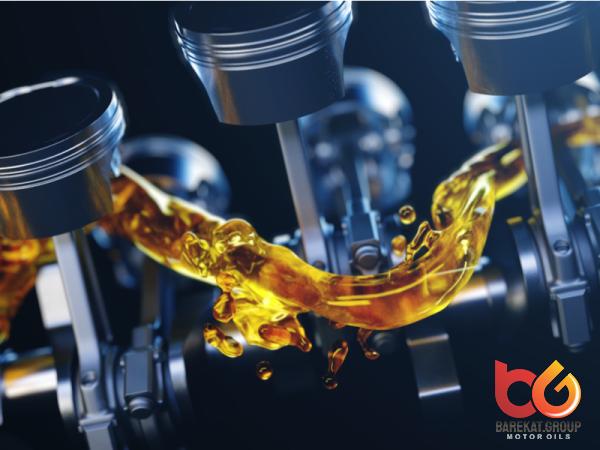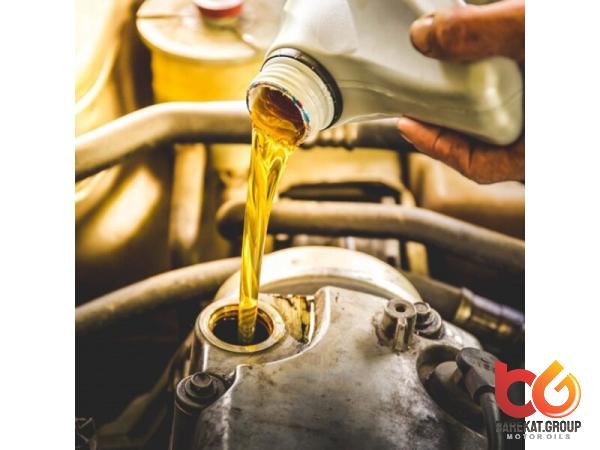The Best Industrial Engine Oil: A Comprehensive Guide to Engine Lubrication Introduction: In the industrial sector, the successful operation of engines is crucial for maintaining efficiency and productivity. One of the main factors that influence engine performance and longevity is the quality of engine oil used for lubrication. In this article, we will delve into the world of industrial engine oils, exploring their importance, key characteristics, and the best options available in the market. Why Engine Oil Matters: Engine oil plays a pivotal role in maintaining the smooth and efficient operation of engines. It lubricates moving parts, reducing friction and wear, while also helping to dissipate heat and prevent corrosion. The right engine oil can extend the lifespan of engines, improve fuel efficiency, and minimize maintenance costs. Therefore, choosing the best industrial engine oil is crucial for the overall performance and longevity of industrial machinery. Key Characteristics of Industrial Engine Oil: 1. Viscosity: Viscosity refers to the oil’s resistance to flow under various temperature conditions. Industrial engine oils are available with different viscosity ratings, such as SAE (Society of Automotive Engineers) 30, 40, or 50. The appropriate viscosity range depends on the operating conditions and the manufacturer’s recommendations for the specific engine. 2. Additives: Engine oils are formulated with additives to enhance their performance. These additives include detergents to keep the engine clean, anti-wear agents to reduce friction, antioxidants to prevent oxidation, and dispersants to suppress sludge formation. The best industrial engine oils have a well-balanced combination of additives to provide optimal protection. 3. Thermal Stability: Industrial engines often operate under extreme temperatures and heavy loads. Therefore, a high-quality engine oil should have excellent thermal stability, ensuring that it can maintain its lubrication properties and protective film even at high temperatures. 4. Resistance to Oxidation: Oxidation occurs when the oil reacts with oxygen at high temperatures, resulting in the formation of acids, sludge, and varnish deposits.
Engine oil
 The best industrial engine oils have advanced oxidation inhibitors to resist oxidation and keep engines clean and free from harmful deposits. 5. Compatibility with Equipment: It is essential to ensure that the chosen engine oil is compatible with the machinery, including seals, gaskets, and rubber components. Incompatibility can lead to leaks, reduced performance, and potential damage to the equipment. Top Brands and Products: 1. Shell Rotella T6 Full Synthetic Heavy Duty Engine Oil: Shell Rotella T6 is a widely recognized and trusted brand in the industrial sector. It offers a synthetic formula designed to provide enhanced protection, improved fuel economy, and extended drain intervals. It meets various international specifications and is suitable for both diesel and gasoline engines. 2. Mobil Delvac 1 ESP Synthetic Diesel Engine Oil: Mobil Delvac 1 ESP is a high-performance engine oil specifically designed for diesel engines. It offers exceptional wear protection, fuel economy, and extended drain intervals. With its advanced technology and low-ash formulation, it meets the latest emission system requirements. 3. Chevron Delo 400 XLE Synthetic Diesel Engine Oil: Chevron Delo 400 XLE is a synthetic blend engine oil suitable for modern diesel engines. It provides excellent oxidation resistance, wear protection, and deposit control. This oil is compatible with exhaust after-treatment systems and helps reduce emissions. 4. Valvoline Premium Blue Extreme Full Synthetic Diesel Engine Oil: Valvoline Premium Blue Extreme is a synthetic oil formulated for heavy-duty diesel engines, including those equipped with exhaust after-treatment systems. It offers advanced soot control, extended drain intervals, and minimal oil consumption. 5. Castrol EDGE Extended Performance Full Synthetic Motor Oil: While primarily designed for gasoline engines, Castrol EDGE Extended Performance is also suitable for certain industrial applications. It provides high-temperature protection, reduced oil degradation, and increased fuel efficiency. Conclusion: Selecting the right industrial engine oil is crucial for the optimal performance and durability of engines in the industrial sector. With various brands and products available, it is essential to consider factors such as viscosity, additives, thermal stability, resistance to oxidation, and equipment compatibility.
The best industrial engine oils have advanced oxidation inhibitors to resist oxidation and keep engines clean and free from harmful deposits. 5. Compatibility with Equipment: It is essential to ensure that the chosen engine oil is compatible with the machinery, including seals, gaskets, and rubber components. Incompatibility can lead to leaks, reduced performance, and potential damage to the equipment. Top Brands and Products: 1. Shell Rotella T6 Full Synthetic Heavy Duty Engine Oil: Shell Rotella T6 is a widely recognized and trusted brand in the industrial sector. It offers a synthetic formula designed to provide enhanced protection, improved fuel economy, and extended drain intervals. It meets various international specifications and is suitable for both diesel and gasoline engines. 2. Mobil Delvac 1 ESP Synthetic Diesel Engine Oil: Mobil Delvac 1 ESP is a high-performance engine oil specifically designed for diesel engines. It offers exceptional wear protection, fuel economy, and extended drain intervals. With its advanced technology and low-ash formulation, it meets the latest emission system requirements. 3. Chevron Delo 400 XLE Synthetic Diesel Engine Oil: Chevron Delo 400 XLE is a synthetic blend engine oil suitable for modern diesel engines. It provides excellent oxidation resistance, wear protection, and deposit control. This oil is compatible with exhaust after-treatment systems and helps reduce emissions. 4. Valvoline Premium Blue Extreme Full Synthetic Diesel Engine Oil: Valvoline Premium Blue Extreme is a synthetic oil formulated for heavy-duty diesel engines, including those equipped with exhaust after-treatment systems. It offers advanced soot control, extended drain intervals, and minimal oil consumption. 5. Castrol EDGE Extended Performance Full Synthetic Motor Oil: While primarily designed for gasoline engines, Castrol EDGE Extended Performance is also suitable for certain industrial applications. It provides high-temperature protection, reduced oil degradation, and increased fuel efficiency. Conclusion: Selecting the right industrial engine oil is crucial for the optimal performance and durability of engines in the industrial sector. With various brands and products available, it is essential to consider factors such as viscosity, additives, thermal stability, resistance to oxidation, and equipment compatibility.
Specifications of Engine oil
 The choices mentioned in this article, including Shell Rotella T6, Mobil Delvac 1 ESP, Chevron Delo 400 XLE, Valvoline Premium Blue Extreme, and Castrol EDGE Extended Performance, are among the top options when it comes to industrial engine oils. Consulting with industry experts and considering manufacturers’ recommendations will further aid in making an informed decision. By choosing the best industrial engine oil, businesses can maximize engine efficiency, minimize downtime, and reduce long-term maintenance costs.I. The Importance of Choosing the Right Industrial Engine Oil The selection of the right industrial engine oil is a critical decision that can significantly impact the performance and longevity of industrial machinery. By understanding the specific needs of their engines and considering various factors, businesses can make informed choices that will optimize their operations. II. Factors to Consider When Choosing Industrial Engine Oil a. Operating Conditions: The operating conditions of an engine, such as temperature and load, play a crucial role in determining the viscosity and thermal stability required. Engines operating in extreme temperatures or under heavy loads may require engine oils with higher viscosity ratings and superior thermal stability. b. Equipment Manufacturer’s Recommendations: Manufacturers provide guidance on the type of engine oil recommended for their specific equipment. Following these recommendations ensures compatibility and maximizes the performance and lifespan of the engine. c. Fuel Type: Different types of fuel, such as diesel or gasoline, require specific engine oils designed to accommodate their unique needs. It is essential to select the appropriate engine oil tailored to the fuel being used. d. Maintenance Intervals: Consideration should be given to the desired maintenance intervals. Some engine oils are formulated to offer extended drain intervals, reducing downtime and maintenance costs. III. Shell Rotella T6 Full Synthetic Heavy Duty Engine Oil Shell Rotella T6 is a highly regarded full synthetic heavy-duty engine oil suitable for a wide range of industrial applications.
The choices mentioned in this article, including Shell Rotella T6, Mobil Delvac 1 ESP, Chevron Delo 400 XLE, Valvoline Premium Blue Extreme, and Castrol EDGE Extended Performance, are among the top options when it comes to industrial engine oils. Consulting with industry experts and considering manufacturers’ recommendations will further aid in making an informed decision. By choosing the best industrial engine oil, businesses can maximize engine efficiency, minimize downtime, and reduce long-term maintenance costs.I. The Importance of Choosing the Right Industrial Engine Oil The selection of the right industrial engine oil is a critical decision that can significantly impact the performance and longevity of industrial machinery. By understanding the specific needs of their engines and considering various factors, businesses can make informed choices that will optimize their operations. II. Factors to Consider When Choosing Industrial Engine Oil a. Operating Conditions: The operating conditions of an engine, such as temperature and load, play a crucial role in determining the viscosity and thermal stability required. Engines operating in extreme temperatures or under heavy loads may require engine oils with higher viscosity ratings and superior thermal stability. b. Equipment Manufacturer’s Recommendations: Manufacturers provide guidance on the type of engine oil recommended for their specific equipment. Following these recommendations ensures compatibility and maximizes the performance and lifespan of the engine. c. Fuel Type: Different types of fuel, such as diesel or gasoline, require specific engine oils designed to accommodate their unique needs. It is essential to select the appropriate engine oil tailored to the fuel being used. d. Maintenance Intervals: Consideration should be given to the desired maintenance intervals. Some engine oils are formulated to offer extended drain intervals, reducing downtime and maintenance costs. III. Shell Rotella T6 Full Synthetic Heavy Duty Engine Oil Shell Rotella T6 is a highly regarded full synthetic heavy-duty engine oil suitable for a wide range of industrial applications.
Buy Engine oil
 Its advanced formulation provides exceptional protection against wear, deposits, and oxidation. The superior viscosity control of Shell Rotella T6 ensures reliable start-up and efficient lubrication even under extreme operating conditions. IV. Mobil Delvac 1 ESP Synthetic Diesel Engine Oil Mobil Delvac 1 ESP is a top-performing synthetic engine oil specifically designed for diesel engines in the industrial sector. Its low-ash formulation and advanced additives reduce both fuel consumption and environmental impact. Mobil Delvac 1 ESP also extends drain intervals, enhancing cost savings and reducing overall maintenance expenses. V. Chevron Delo 400 XLE Synthetic Diesel Engine Oil Chevron Delo 400 XLE is a high-quality synthetic diesel engine oil suitable for modern diesel engines equipped with exhaust after-treatment systems. It provides excellent oxidation resistance, ensuring cleaner engines and lower maintenance costs. Delo 400 XLE also meets the latest emission system requirements, contributing to a more sustainable operation. VI. Valvoline Premium Blue Extreme Full Synthetic Diesel Engine Oil Valvoline Premium Blue Extreme is a premium full synthetic engine oil designed for heavy-duty diesel engines. It offers advanced soot control, extended drain intervals, and compatibility with exhaust after-treatment systems. The excellent wear protection and reduced oil consumption provided by Valvoline Premium Blue Extreme result in improved engine performance and reduced operating costs. VII. Castrol EDGE Extended Performance Full Synthetic Motor Oil While primarily formulated for gasoline engines, Castrol EDGE Extended Performance can also be suitable for certain industrial applications. This full synthetic motor oil provides exceptional high-temperature protection and reduced oil degradation. Its advanced formula contributes to increased fuel efficiency, extending engine life and lowering maintenance costs.
Its advanced formulation provides exceptional protection against wear, deposits, and oxidation. The superior viscosity control of Shell Rotella T6 ensures reliable start-up and efficient lubrication even under extreme operating conditions. IV. Mobil Delvac 1 ESP Synthetic Diesel Engine Oil Mobil Delvac 1 ESP is a top-performing synthetic engine oil specifically designed for diesel engines in the industrial sector. Its low-ash formulation and advanced additives reduce both fuel consumption and environmental impact. Mobil Delvac 1 ESP also extends drain intervals, enhancing cost savings and reducing overall maintenance expenses. V. Chevron Delo 400 XLE Synthetic Diesel Engine Oil Chevron Delo 400 XLE is a high-quality synthetic diesel engine oil suitable for modern diesel engines equipped with exhaust after-treatment systems. It provides excellent oxidation resistance, ensuring cleaner engines and lower maintenance costs. Delo 400 XLE also meets the latest emission system requirements, contributing to a more sustainable operation. VI. Valvoline Premium Blue Extreme Full Synthetic Diesel Engine Oil Valvoline Premium Blue Extreme is a premium full synthetic engine oil designed for heavy-duty diesel engines. It offers advanced soot control, extended drain intervals, and compatibility with exhaust after-treatment systems. The excellent wear protection and reduced oil consumption provided by Valvoline Premium Blue Extreme result in improved engine performance and reduced operating costs. VII. Castrol EDGE Extended Performance Full Synthetic Motor Oil While primarily formulated for gasoline engines, Castrol EDGE Extended Performance can also be suitable for certain industrial applications. This full synthetic motor oil provides exceptional high-temperature protection and reduced oil degradation. Its advanced formula contributes to increased fuel efficiency, extending engine life and lowering maintenance costs.
Engine oil + buy and sell
 VIII. Market Trends and Innovations in Industrial Engine Oil The industrial engine oil market is continuously evolving, with manufacturers investing in research and development to meet ever-changing industry needs. Advancements include the development of oils with improved resistance to oxidation, enhanced fuel economy, and extended drain intervals. The industry is also witnessing innovations in additives that improve engine cleanliness and overall performance. IX. Industry Best Practices for Engine Oil Management To ensure optimal performance and extend engine life, businesses should also implement best practices for engine oil management. This includes regular oil analysis to monitor oil condition and identify any potential issues early on. Proper storage and handling of engine oil, such as avoiding exposure to contaminants and maintaining appropriate storage temperatures, are also crucial for maintaining oil quality. X. Conclusion Selecting the best industrial engine oil is vital for the smooth operation and longevity of industrial machinery. Factors such as operating conditions, manufacturer recommendations, and fuel type should be considered when choosing engine oil. Options like Shell Rotella T6, Mobil Delvac 1 ESP, Chevron Delo 400 XLE, Valvoline Premium Blue Extreme, and Castrol EDGE Extended Performance offer high-performance solutions tailored to specific engine requirements. By following industry best practices for oil management and staying updated on market trends and innovations, businesses can ensure optimal engine performance, reduced maintenance costs, and improved overall efficiency.
VIII. Market Trends and Innovations in Industrial Engine Oil The industrial engine oil market is continuously evolving, with manufacturers investing in research and development to meet ever-changing industry needs. Advancements include the development of oils with improved resistance to oxidation, enhanced fuel economy, and extended drain intervals. The industry is also witnessing innovations in additives that improve engine cleanliness and overall performance. IX. Industry Best Practices for Engine Oil Management To ensure optimal performance and extend engine life, businesses should also implement best practices for engine oil management. This includes regular oil analysis to monitor oil condition and identify any potential issues early on. Proper storage and handling of engine oil, such as avoiding exposure to contaminants and maintaining appropriate storage temperatures, are also crucial for maintaining oil quality. X. Conclusion Selecting the best industrial engine oil is vital for the smooth operation and longevity of industrial machinery. Factors such as operating conditions, manufacturer recommendations, and fuel type should be considered when choosing engine oil. Options like Shell Rotella T6, Mobil Delvac 1 ESP, Chevron Delo 400 XLE, Valvoline Premium Blue Extreme, and Castrol EDGE Extended Performance offer high-performance solutions tailored to specific engine requirements. By following industry best practices for oil management and staying updated on market trends and innovations, businesses can ensure optimal engine performance, reduced maintenance costs, and improved overall efficiency.
Your comment submitted.